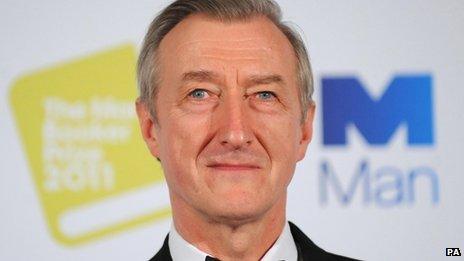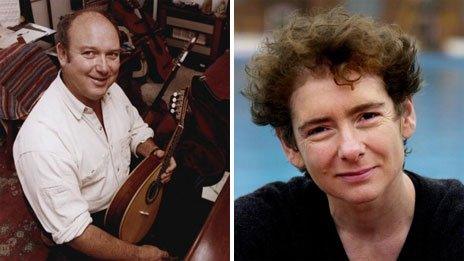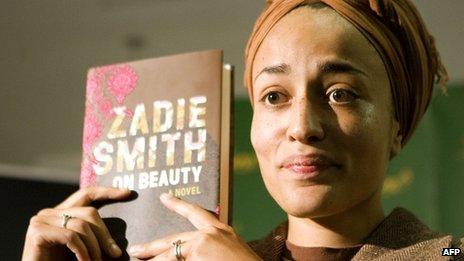How has the Granta list shaped the literary landscape?
- Published

The 20 names on the 2013 list are a closely-guarded secret - until next week
The once-a-decade Granta list of the 20 brightest and most promising young British writers is about to be revealed. What impact has it had on the literary landscape over the last 30 years?
The Granta Best of Young British Novelists list swoops into view every 10 years like a literary comet.
If previous years are anything to go by, the latest list - announced on Monday - will be accompanied by a long tail of debate, controversy and boosted book sales.
Granta's first list of 20 writers aged under 40 was published in 1983 and set the bar for the decades to come.
Many of the class of '83 have become household names, such as Martin Amis, William Boyd, Kazuo Ishiguro, Salman Rushdie, Julian Barnes, Pat Barker, Ian McEwan and Rose Tremain.
The 1993 list included Iain Banks, Louis de Bernieres, Alan Hollinghurst, Hanif Kureishi, Ben Okri, Will Self and Jeanette Winterson.

Julian Barnes, who was on the original 1983 list, won the Man Booker Prize in 2011
One commentator is said to have sniped in 1993: "But who is Louis de Bernieres?" The answer came a year later when Captain Corelli's Mandolin turned into an international bestseller.
The last Granta list - in 2003 - included Monica Ali (whose Brick Lane was still in manuscript form when she was elevated into the literary firmament), Rachel Cusk, AL Kennedy, David Mitchell, Zadie Smith and Sarah Waters.
"The 1983 list was exceptional," says Jonathan Ruppin, web editor at Foyles, external. "There were some outstanding writers in there who have become major figures in the world of literature, and when you look at the 1993 and 2003 list the hit rate is still pretty high."
He predicts that the 2013 list will prove as much as a talking point as in previous decades. "Obviously it will provoke a lot of debate and a lot of people will dismiss it - but anything that gets people talking about books in general can only be beneficial.
"Books aren't a central part of our culture any more - literature is a bit second tier. There's plenty of coverage of films, music, TV and video games. It's rare that you have a water cooler moment regarding a book."
So how did it all begin? The 1983 campaign was dreamed up "in the bath" by Desmond Clarke, who was at the time the director of the Book Marketing Council.
He describes the BMC as "a characteristically Eighties organisation" which undertook promotions and research on behalf of the book trade.

Louis de Bernieres and Jeanette Winterson were on the 1993 list
The list of 20 young novelists inspired a special issue of literary magazine Granta, under the editorship of Bill Buford.
Introducing the second list in 1993, Buford wrote "the campaign's greatest value was this: it became, despite itself, a serious statement about British literary culture".
One of the most striking images from the first campaign was a group photograph of the young novelists by Lord Snowdon published in the Sunday Times Magazine.
'Bit sniffy'
But not everyone was happy. Clarke recalls how the list managed to ruffle a few feathers in literary circles.
"There were some who looked down their noses at the way we were marketing literary fiction and making it fun. The whole idea of the list was to create controversy and get people arguing. Every time the literati got a bit sniffy that worked in our favour."
With the backing of bookshops and libraries, the first Best of Young British promotion helped sell an additional 250,000 books.
"Before the campaign some of the books had only sold a few hundred," notes Clarke. "Many of them were not published in paperback."
As literary agent Andrew Kidd points out, the Granta list has a different function to an annual literary award, such as his newly-founded Folio Prize , externalor the long-established Man Booker, external.
"Most literary prizes are for single works - it's a snapshot of a writer at a certain point in his or her career pegged to a particular book.
"The Granta list is more about recognising who, in the eyes of the Granta judges, are the most exciting emerging talents - it's as much about a prediction of future work as it is about the body of work to date.
"It generates a different kind of buzz . From a readers' perspective it's about signalling the writers you want to be following over the decades to come."
But what effect does being on a list like this have on a relatively unknown writer?
"Any level of success puts pressure on an author and makes the expectations of their publisher higher," says Ruppin. "But it does give them a profile that is extraordinarily valuable in what is a ridiculously crowded market."
That was certainly true in the case of Alison Moore's debut novel The Lighthouse, from independent publisher Salt, external, which made the Man Booker shortlist in 2012.
Jen Hamilton-Emery, Salt's co-director, recalls how the book's inclusion caused a huge spike in sales and media interest.
"It's dream come to true to be on a list like that. Nothing can prepare you. We'd never had to contend with print runs in the tens of thousands. All the logistics came into play and we were able to cope."
The Norfolk-based publisher, formed in 1999, has built up a Twitter following of more than 85,000 in recent years.
"When you're small your have to find creative ways of marketing that don't cost money," explains Hamilton-Emery. "We've not had publicists to rely on. We've enjoyed bringing people on our journey with us through social media."

Zadie Smith was on the last Granta list in 2003 - could she make another appearance in 2013?
Literary lists, she says, have a role to play beyond book sales. "They are wonderful tools for marketing but they are more than that. The Granta and Booker have got proper weight behind them and proper credibility. As a publisher we would obviously like people to read wider than the list, but it can be a catalyst to more creative reading."
Desmond Clarke, meanwhile, is looking forward to seeing how his 1983 concept will play out in 2013.
"Of course it's flattering when one's idea is repeated and copied several times over. I'm not particularly knowledgeable about new authors so I'm going to be given a list of 20 exciting new novelists - and hopefully amongst them will be the new Ian McEwan, Salman Rushdie, William Boyd or Kazuo Ishiguro..."
John Freeman, Granta's editor since 2009, tells The Guardian, external the biggest challenge for the judges has been "how to come up with an amalgamated definition of hope for the novel as a form".
"My own preference is for novelists who can tell big stories, which sounds easy, but in my experience is as rare as the long-whiskered owlet. We are all hoping we've got it just as right as the three lists before us."
BBC Radio 4's Front Row will announce the 20 best of Young British Novelists around 1930 BST on 15 April at the same time as the announcement at the British Council in London.
- Published13 March 2013